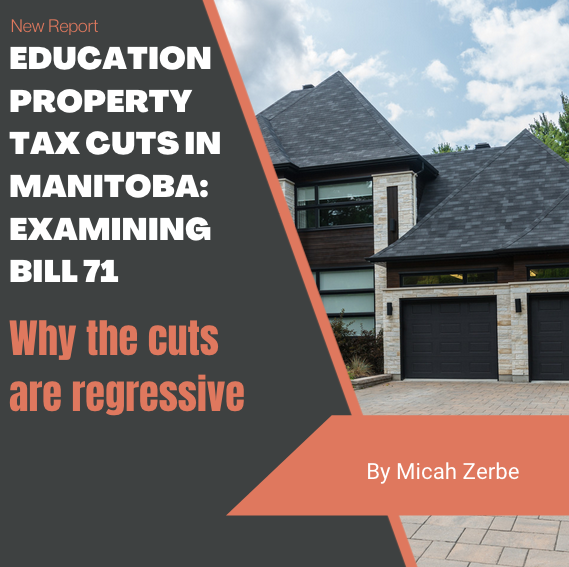By Micah Zerbe

For decades, education in Manitoba has been funded by a mix of general provincial revenues and property taxes set by local school boards. In April 2020, Manitoba’s government introduced Bill 71, which was intended to initiate the elimination of education property taxes as had been promised during the 2019 election. However, this Bill is regressive in nature and fails to achieve its intended purpose of lowering taxes to Manitobans in need.
Bill 71 established a system under which a rebate cheque would be sent to all property owners in proportion to their education property taxes owed. For residential and farm property owners, the rebate started at 25 percent of education property taxes and could be increased in subsequent years. The bill also reduced all education property tax credits available under the Income Tax Act by the same proportion as the rebate. In addition, the bill provided for a zero percent rent guideline increase for 2022 and 2023.
For 2021, the government estimated that $248 million in rebate cheques would be sent out, and the cost of mailing these rebates was $1.3 million. Given the reduction to the education property tax credit, the net cost of the rebate was $151 million in 2021. In the same year, the government posted a deficit of $2 billion. Thus, while the measure was framed as financial assistance, the bill essentially amounted to a tax cut for property owners that was funded through borrowing in a period of significant deficits.
While the original intention was to provide a rebate of 25 percent in 2021 and a rebate of 50 percent in 2022, after becoming Premier, Heather Stefanson, announced in October 2021 that she would likely delay the further “cut,” but keep the elimination within the original ten-year promise.
Bill 71 presented several policy issues. The first issue was that the government never clearly articulated a persuasive policy goal for eliminating education property taxes. Although the government announced that the bill would allow “governments to create a new funding formula that will focus on resources of where they’re needed most and achieve better results for students,” the potential benefits to the education system consistently appeared to be peripheral to the goal of reducing taxes. But if the purpose was to provide financial support to Manitobans who needed it, it is unclear why the rebate was tied to education property taxes or why the rebate was not income-tested for Manitobans who were demonstrably in need of financial support.
Secondly, the bill ventured into the area of education finance reform, but the government sidestepped the long history of debates on this issue. Although all other provinces have centralized their education funding systems, seven out of ten continue to use property taxes to fund education. In AB and ON property taxes are collected, segregated, and remitted to school boards, but in BC a “school tax” is collected and then comingled with general revenues from which education is funded. Bill 71 indicated an intention to move away from this trend and exclusively use general revenues, but this decision did not stem from any recent comprehensive review of Manitoba’s system. Thus, the merits of this direction do not appear to have been considered by the government.
Thirdly, the key justification for Bill 71 given during the legislative debates was that the bill was necessary to provide financial support to Manitobans during the pandemic. However, the bill operated to give the largest rebates to those who hold the most valuable property instead of those who were most in need of financial assistance. Therefore, Bill 71 was ineffective in implementing a strategy to assist Manitobans experiencing financial hardship due to the pandemic.
Finally, if the Bill was intended to provide support, renters were left out of the system entirely. Renters would be adversely affected by the reduction to their education property tax credit, but the government’s 2021 budget estimated that renters would see a modest net benefit when considering the rent freeze. However, because landlords frequently apply for, and are granted above guideline rent increases, it is likely that renters will see a lesser benefit than estimated. CBC reported all above guideline rent increases were approved in 2019-2020 raising rents in 310 buildings for 20,000 Manitoba renters, some as high as 30 – 40 per cent. Regardless, if the purpose of Bill 71 was to provide financial assistance, it is difficult to see why such a comparatively small possible benefit was arranged for renters, who are more likely to have lower wages than owners.
Last November the Manitoba government announced a new committee to assist in the creation of an education funding model, intended to be implemented for the 2023 – 2024 school year. The issues of equity in education funding should be addressed in this review. It is significant that a comprehensive review was not done before the decision to eliminate education property taxes, and the November announcements suggests that the new system will accommodate the elimination of education property taxes. There are potential benefits to using property taxes to fund education, and an approach that uses both general revenues and property taxes has been adopted in most other provinces.
Bill 71 raised significant policy questions, but largely in a superficial manner that did not engage with the core of those issues. There was little policy basis for eliminating education property taxes. The result was a poorly executed rebate system which served to assist only property owners, without justifying why they were most in need of the rebate. Unfortunately, the government was not willing to respond effectively to the legitimate shortcomings of the bill, and thus, democracy in Manitoba suffered.
Micah Zerbe is a law student at the University of Manitoba and will be graduating in May 2022. He previously obtained a Bachelor of Arts in Political Studies at Canadian Mennonite University.


